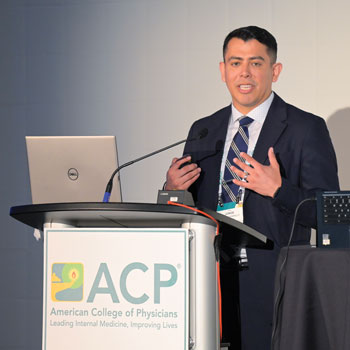Gender-affirming care amid political turmoil
LGBTQ+ care involves a range of services, including mental health care, medical care, and social services at all ages, with clear, well-established, and evidence-based standards of care.
Imagine life as a left-handed person over a century ago: discriminated against, thought of as needing correction, forced to use their right hands to comply with societal expectations.
Now imagine life for gender-diverse populations, who can face similar discrimination and feelings of standing out in the wrong way. Jorge A. Ramallo, MD, MPH, FACP, a med-peds physician for Inova Health in Alexandria, Va., drew that comparison in a panel discussion on “Gender-Affirming Care: Health Policy and Practice” at Internal Medicine Meeting 2025, held in New Orleans in April.

“Being left-handed is just a normal part of the human condition. It's not pathological,” said Dr. Ramallo.
Similarly, gender-affirming care is a part of primary care, said Dr. Ramallo, who joined in a panel discussion at Internal Medicine Meeting 2025 moderated by Haidn Foster, MD, ACP Resident/Fellow Member, and law professor Ames Simmons, JD.
Dr. Foster pointed out that gender-affirming care can be any care that is provided to both cisgender and transgender patients. Other examples of gender-affirming care include counseling and therapy; temporary measures such as tucking, binding, and packing for those who haven't yet or choose not to undergo surgical interventions; puberty blockers and full hormone replacement therapy; surgery; and interventions such as speech therapy or hair removal.
Gender-affirming care is actually life-saving care for people of all ages, added Dr. Ramallo, who helped to establish the first primary care clinic for the LGBTQ+ community in northern Virginia and is now its medical director. “It is not a single category of services, but instead a range of services, including mental health care, medical care, and social services at all ages. Clear, well-established, and evidence-based standards of care exist on who can access what form of gender-affirming care and when they are able to receive it,” he said.
Dr. Ramallo called for internal medicine physicians to be at the forefront of science and patient care in this area. “I feel that we as a group, as internal medicine, we have lagged behind in the care of the transgender population, and we have an opportunity to really advocate for our patients and step up to the plate,” he said. Family medicine, OB/GYN, and pediatrics have been more prominently in the lead on these issues, he said.
Gender-diverse patients are part of every health care setting, Dr. Ramallo concluded. “Providing respectful, affirming care enhances patient trust and health outcomes,” he said. “As medical professionals, we have the opportunity to bridge historical gaps in care and foster a more inclusive field of internal medicine.”
The legal landscape
“The reality is that the provision of gender-affirming care is under attack throughout this country,” Dr. Foster said. “We've seen a flurry of executive orders since the new administration took office, including an aim to end support for gender transitions for those under the age of 19 years old, so minors, as well as those of the age of 18; an executive order aimed at banning transgender participation from women's and girls' sports; banning transgender service member participation in our military, and many more.”
Providing inclusive care has become much more difficult in light of national politics, agreed Mr. Simmons, who identifies as a queer, White, transgender man.
One of the most recent policy developments is a proposed rule about essential health benefits published in the Federal Register on March 19. This represents “the very first rule that CMS issued in [an] attempt to regulate gender-affirming care as essential health benefits for not just young people, but also for adults,” said Mr. Simmons. It would prohibit plans on Affordable Care Act exchanges from providing essential health benefit protections to what the federal government calls sex trait modification services, “which are not a thing that exists. They're not really defined even in the rule,” he said.
Mr. Simmons noted that he and others could lose important benefits. “There are a lot of protections that go away, from annual and lifetime dollar caps, for example, protections against cost sharing. … [I]f this rule is finalized, it's going to make health care more expensive for people who are seeking whatever the government comes to decide constitutes ‘sex trait modification services.’”
States have also been limiting gender-affirming care via Medicaid policy; for example, Kentucky recently codified a ban on Medicaid paying for transgender health care.
“We are seeing more states that are adding bans on any public funding of transgender health care that are including adults as well as young people,” Mr. Simmons said. “So, while I certainly think the policy focus needs to be on ensuring that young people are able to get the care that they need, we should also, I think, assume that this is the first in a trajectory of limiting transgender health care for everyone in our country.”
Restrictions on state-funded health care also apply to states' own employees, Mr. Simmons said, adding that Georgia now has a proposed bill that would ban gender-affirming health care for state employees. It would also prohibit care for transgender people who are incarcerated, “and I think that's an important population for us to keep in mind. They, in many ways, tend to be invisible.”
The U.S. Supreme Court is set to issue a ruling about transgender health care in U.S. v. Skrmetti, on Tennessee Senate Bill 1, which categorically prohibits all medical treatments intended to allow “a minor to identify with, or live as, a purported identity inconsistent with the minor's sex” or to treat “purported discomfort or distress from a discordance between the minor's sex and asserted identity.” The court will determine whether that violates the Equal Protection Clause of the 14th Amendment.
Oral arguments were held Dec. 4, and the Supreme Court is expected to render a decision the last week of June. “There'll be a lot of eyes watching to see what the Supreme Court does,” Mr. Simmons said.
Amid these legal and political developments, there is also a burgeoning field called legal epidemiology that investigates the impact of laws and policy on people's health.
For example, a study published by BMC Public Health in March 2024 found that the impact of health policy varies depending on the number of marginalized identities a person holds. Some policies that were significantly associated with better self-rated health for White trans women participants were linked with worse self-rated health for trans women of color, Mr. Simmons said.
“So, we should keep that in mind ... really talking to the patient that's in front of you to find out what their experience is, because it just may not be the same as what you might be hearing about in the news,” Mr. Simmons said.
These policies also can have effects on health care workers, for example, making them more fearful for their safety and ability to practice and to maintain “licensure in any given state, about your professional liability insurance, and your ability to practice through telehealth,” Mr. Simmons said. “The most important thing is how grateful we all are that people who are providing us care are continuing to do that, because that is so important right now for people to be able to find sources of care.”
ACP intervenes
Dr. Foster cited many of ACP's efforts supporting access to gender-affirming care. He is the Chair-elect of ACP's Council of Resident/Fellow Members and sat on ACP's Health and Public Policy Committee when it reviewed and updated its policy on LGBTQ health and health care. He founded and runs Pride in Practice, an LGBTQ health care education charity, and authored several of the American Medical Association's policies on LGBTQ health.
Citing a press release by former ACP President Isaac O. Opole, MBChB, PhD, MACP, Dr. Foster said that ACP strongly believes in the appropriate provision of evidence-based gender-affirming care and the equitable treatment of all patients, regardless of sexual orientation or gender identity. The statement also notes ACP is extremely concerned about discrimination against LGBTQ+ individuals, and stresses that health is a human right that entails an ethical obligation of society to provide access to health care, including gender-affirming care.
An ACP position paper published last year supports additional research and scientific inquiry into gender-affirming care to better improve care for gender-diverse people; opposes explicit restrictions on educational content that includes sexual orientation and gender identity; recommends that public and private health benefit plans include comprehensive gender-affirming care; and affirms the health benefits of participation in athletics, “with a call for quantitative research to help better understand how the participation of transgender athletes in gender-segregated athletics may impact the overall field,” Dr. Foster said.
Mr. Simmons concluded by calling attention to ACP's statement on trans health care. “It might not feel like it's having an impact, but it's critically important for the voices of health care providers to be part of the conversation,” he said.



